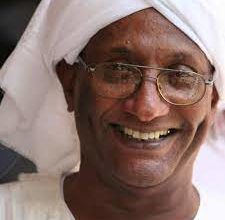Addis Ababa Declaration: Contrary to the framework, SAF and RSF will be Dissolved into a New National Army (1-2)

By Abdullah Ali Ibrahim
The Addis Ababa Declaration between the Coordination of Civil Forces and Democracy (Taqaddum) and the Rapid Support Forces (RSF) (on January 2) did not find acceptance even among parties of Taqaddum, or among those who did not disagree with it that the priority was to stop the war, described as “absurd.” Some of them took it with a severity that overshadowed its merits in approaching the issue of stopping the war and the measures they agreed upon to secure and provide relief to civilians, regardless of their opinion. The Declaration stated the “RSF” readiness to stop hostilities with the Sudanese Armed Forces (SAF) immediately and unconditionally and through direct negotiation. The declaration included an agreement to create the conducive conditions for civilians to return to their homes in areas affected by the war by deploying police in civilian areas and operating service and production facilities. There will also be a national committee for the protection provided for civilians composed of nationalist figures who, they understandably stated, should be advocates of stopping the war, i.e. “Taqaddum” members.
The “RSF” approved a request from “Taqaddum” to release 451 prisoners of war who were being held in custody. The reactions to the Declaration seemed to suggest that it may have been the shortest way to stop the war. The Declaration’s critics from circles within “Taqaddum”, or those close to it, is that they consider it being a suspicion involvement, that is, coordination, with “RSF” because it suspiciously mixed in it a statement of valuable measures to stop the war that the two parties agreed upon with a future covenant on a vision for a new Sudan, which came as a charter between Taqaddum and the “RSF. This suspicion prompted the Unionist Party, which is one of the Forces for Freedom and Change, (FFC) to say that “Taqaddum” has adopted in the Declaration the vision of “RSF” over the war and its aftermath, and that the SAF were completely kept away. This is what the Communist Party concluded by saying that the declaration went beyond its framework to a political agreement between Taqaddum and the “RSF” which is implicated along with the SAF in war crimes.
What was most interesting about political Declaration was its type in the contact system. It was agreed among its critics that, as a form of communication, it could not be issued by a group that came out to stop the war. The doctor and veteran politician Al-Wathiq Kamir agreed with the Communist Party, which rebelled against the FFC at the beginning of the revolution in 2019, that it was a Declaration that “shuffles the cards.” In the opinion of the Unionist Party, “Taqaddum” made a mistake by issuing a Declaration about its meeting with “RSF,” while it was only necessary to issue a statement about what happened between them regarding stopping the war. The declaration, according to the Unionist Party, is usually about the principles of what is happening between warring parties, while the statement is merely a report on what happened between the parties in relation to proposed measures for the two parties to the war to concede. The Unionist Party added that the political issues regarding the post-war state, which the declaration touched upon, do not concern either of the two warring military forces, but rather are the jurisdiction of the civil political forces, which is what the Communist Party agreed with them on, saying that the declaration fell out from the meaning of stopping the war, providing relief, and securing the return of war displaced people to seek a charter that encourages Sudan to be governed federally, although the two parties, Taqaddum and RSF, do not represent the Sudanese people.
Opinions on the Declaration touched on what Dr. Abdul Rahman Al-Ghali, a leader in the Umma Party, a member of Taqaddum, called “gains” for “RSF” from the Declaration. Some circles believed that it was merciful with “RSF” in a way that was not proportional to its crime. The Unionist Party denounced the Declaration because it did not condemn the escalation of “RSF” with an explicit reference to its unnecessary infringements in the same way as Wad Medani. Al-Ghali agreed with it that the Declaration did not contain a commitment to a ceasefire (this was stated in the phrase “unconditional cessation of hostilities in negotiations with the armed forces”) or a demand after expanding the war, or at least limiting it to military targets without civilians and infrastructure institutions, and preserving public funds by preventing the looting of banks. The Unionist Party considers the item on the formation of civil administrations in areas controlled by the “RSF” as an advantage for it.
As for the two priceless gains of “RSF” that are not comparable to any gains in the Declaration, are the concurring of “Taqaddum” with it in holding the Islamists of the Ingaz regime, the remnants, as being at the button of starting the war. And Furthermore removing the embarrassment of “integration” in the armed forces by the expected military reform. The preamble of the declaration stipulated that the war broke out to block the path to the December 2019 revolution. One does not need much intelligence to recognize those who block the path of the revolution. The statements of “RSF” and “Taqaddum” together agree that the remnants are the wrongdoers in igniting the war through cunning to eliminate the revolution and restore their exterminated regime. “Taqaddum” statement on December 29, 2023 attributed the armed forces’ failure to respond to IGAD’s call for a meeting to negotiate an end for the war, to the remnants. “They are the ones who ignited this war in the first place, and are calling for its continuation for fear that a peaceful negotiated solution will lead to resuming the democratic path, achieving the goals of the glorious December Revolution, and eliminating their agenda represented by the return of the tyranny and corruption regime led by the National Congress Party”.
One wonders why the declaration included a paragraph stipulating the formation of a credible fact-finding committee to uncover the facts about who started the war. In its preamble, the declaration seemed impatient with the outcome of the committee that it recommended forming to investigate the facts about the outbreak of war. This is what we call “palpation after slaughtering.” I do not know, with the situation as it is now, what will tempt the armed forces to accept the Declaration of “Taqaddum”, which not only burdened them with igniting war, but also indicted them to be waging a war by proxy, not their own war, but on behalf of the remnants.
(To be continued)



